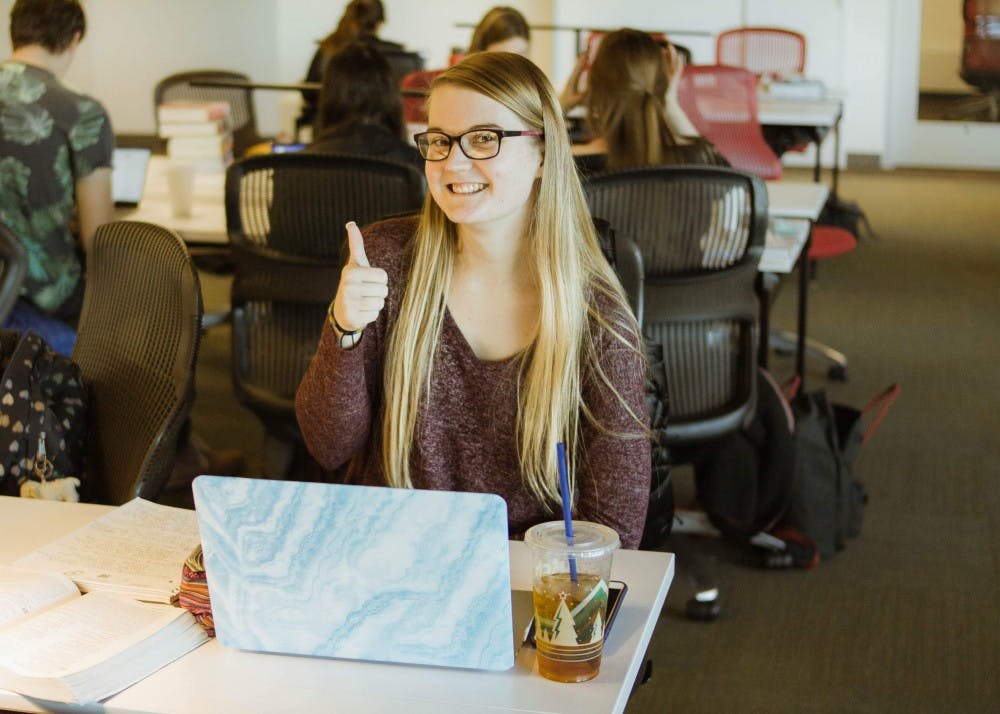Happy Dead Week, Pilots! Okay, maybe it’s not so happy, but I have good news for you. There’s only a few days left in this semester, and then we can head home, binge watch Christmas movies and enjoy being with our families for an entire month.
But before that, we all have to suffer through finals week together. For many students, final exams either make or break their grades. Luckily, UP offers an amazing array of resources to help you be successful, especially in a high-stress time like finals week.
As a student who truthfully enjoys planning out her life and designing study tactics, I thought it might be helpful to share some of my favorite study hacks I’ve learned over the years from my high school IB diploma days to now. Since my hacks might not be the “secret sauce” for every person, I have also included some on-campus resources you can use for free as a student here at UP. With that said, here are Natalie’s Seven Tips to Kick Butt on Final Exams.
1) Make a study plan as early as possible. With so many classes to study for, it’s incredibly important to map out your days in advance so you are more likely to stick to the plan, not procrastinate and make sure everything gets done on your to-do list.
2) Schedule personal time. You’ve heard it before and I’ll say it again: Balance is crucial. Make sure you schedule personal time in your calendar FIRST and make it a priority. No one wants to spend 8 hours in a row studying for 5 days straight, so make sure you’re scheduling time to eat, sleep, go to the gym, take a trip to Dutch Bros or do whatever helps you destress.
3) Use the Writing Center. Seriously, go see them. If you have a paper due as one of your finals, the student writing assistants can help you a TON, and professors love to see that you’re taking initiative to put in work and do a good job. Each assistant takes notes during your meeting and will email them to you and your professor, so your prof knows the improvements you’ve made.
The Learning Commons (in BC 163) also offers tutoring options in almost every subject and class, so it might help you to explore working with one of these students and take advantage of their knowledge and experience.
4) Use old quizzes and exams as a study tool. In a recent TED Talk I watched (yes, I watch TED Talks in my free time), researchers found that students who do practice tests or rework old exams get higher marks than students who simply read their notes or study from flashcards. Take a look at old tests you’ve taken in the class and rework problems to see what you remember and what you should refresh yourself on.
5) Book an appointment with Br. Tom. Br. Thomas Giumenta, the Learning Assistance Counselor in the Shepard Academic Resource Center (SARC), is an incredible resource for students who are struggling to find their best study style or save their grades with final exams. He can help with anything from time management to study skills to test anxiety.
Giumenta knows from experience that learning is incredibly unique to individual students, as some will learn or study differently from others. In that way, it’s hard to compile a list of surefire ways to be successful in your exams.
“I wouldn’t point to standard techniques without trying to customize or individualize the application of those techniques to a person’s own academic history,” he says. “It has to be individualistic.”
While you can definitely make your own study plan like I have in the past, Giumenta is an expert and wants to help students succeed. If you want a more individualized study plan or have struggled with this in the past, you can schedule an appointment with him in Moodle under the Advising course menu.
6) Check out the Academic Toolkit. Giumenta can be great for individualizing your study plan, but it’s also good to have some easy tips you can use outside a unique session with him, especially if you’re running low on time to relearn an entire class’ worth of material. This is an extensive resource provided through the Academic Resource Center for everything from paper writing to test taking, and can help students find a starting place when they begin their study journey.
7) Choose the right study location. Where you study can be just as important as what you study. Find the place that gets you in the zone, whether that be your favorite local coffee shop — Cathedral Coffee is a personal favorite of mine — or the quiet floor of the library. Additionally, try not to study in your bed, as your brain will start to associate that location with alertness instead of relaxation, which can interrupt your sleep.
So, Pilots, good luck on all your finals and remember: You’re just a few days away from a well-deserved month off. Kick butt, study hard and don’t forget to breathe.
Natalie Nygren is the community engagement editor at The Beacon. She can be reached at nygren20@up.edu.








